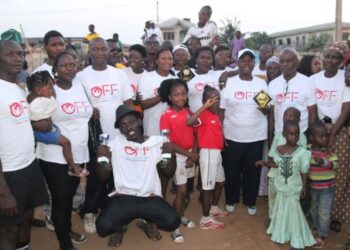By Monday Nas Ozoya, MSc, MCIMSPA
Football is a powerful force in Nigeria, uniting communities and fostering dreams of greatness. Yet, the beautiful game is marred by safeguarding issues. With proper regulation and implementation, safeguarding can catalyze positive social and economic development within Nigerian football.
In a recent proposal, we’ve outlined key issues and concrete steps to create a safer, more nurturing environment for our football community. Here’s a glimpse of what we’re advocating for:
🔍 The Issues:
📌 Child Abuse and Exploitation: Children involved in football are vulnerable to physical, sexual, and emotional abuse. Unethical practices like excessive training, age and match manipulation, lack of proper equipment and trafficking can hinder their development.
📌 Lack of Transparency: Opaque coaches and player recruitment processes and poor record-keeping create an environment for exploitation. Young talents can be lured away from education or proper care.
📌 Limited Awareness: Many stakeholders, including coaches, parents, and officials, lack a proper understanding of safeguarding principles and practices. This creates blind spots and leaves children at risk.
🛠️ Building Solutions:
- Strong Regulatory Framework
📌 Develop a National Safeguarding Policy: The Nigerian Football Federation (NFF) needs a comprehensive policy setting out clear guidelines and reporting procedures for all stakeholders in the game.
📌 Mandatory Safeguarding Training: Coaches, referees, club officials, and others working with children must undergo mandatory training on safeguarding principles.
📌 Independent Safeguarding Officer: The NFF should create an independent safeguarding officer role to oversee policy implementation and investigate reported incidents.
- Empowering Stakeholders:
📌 Parental Education: Programs must educate parents on their roles in safeguarding their children’s well-being, including choosing responsible coaches and understanding signs of abuse.
📌 Player Development Programs: Structured player development programs focusing on education alongside football can provide holistic support and create a safer environment for young players.
- Transparency and Accountability:
📌 Robust Player Registration System: Implement a national player registration system with verifiable identification processes to protect young players from exploitation and trafficking.
📌 Open Communication Channels: Create safe spaces for players, parents, and officials to report concerns or suspicions of abuse without fear of retribution.
✨ The Benefits:
By prioritizing safeguarding, Nigerian football can reap numerous benefits:
📌 Enhanced Player Welfare: Protected players can focus on their development, leading to better performance and a healthier talent pool.
📌 Increased Participation: A safe environment attracts more families to youth football, fostering social inclusion and community engagement.
📌 Improved Reputation: Strong safeguarding practices project a positive image of Nigerian football internationally, attracting sponsors and investors.
📌 Sustainable Development: A robust infrastructure that nurtures talents ethically will fuel Nigerian football’s growth and economic success.
📝 Conclusion:
Proper safeguarding protects children and builds a stronger future for Nigerian football. By prioritizing safe environments, we can empower players, cultivate talent, and ensure Nigeria’s beautiful game thrives with integrity.
Monday Nas Ozoya, MSc, MCIMSPA
FIFA Guardian Safeguarding Platinum

















